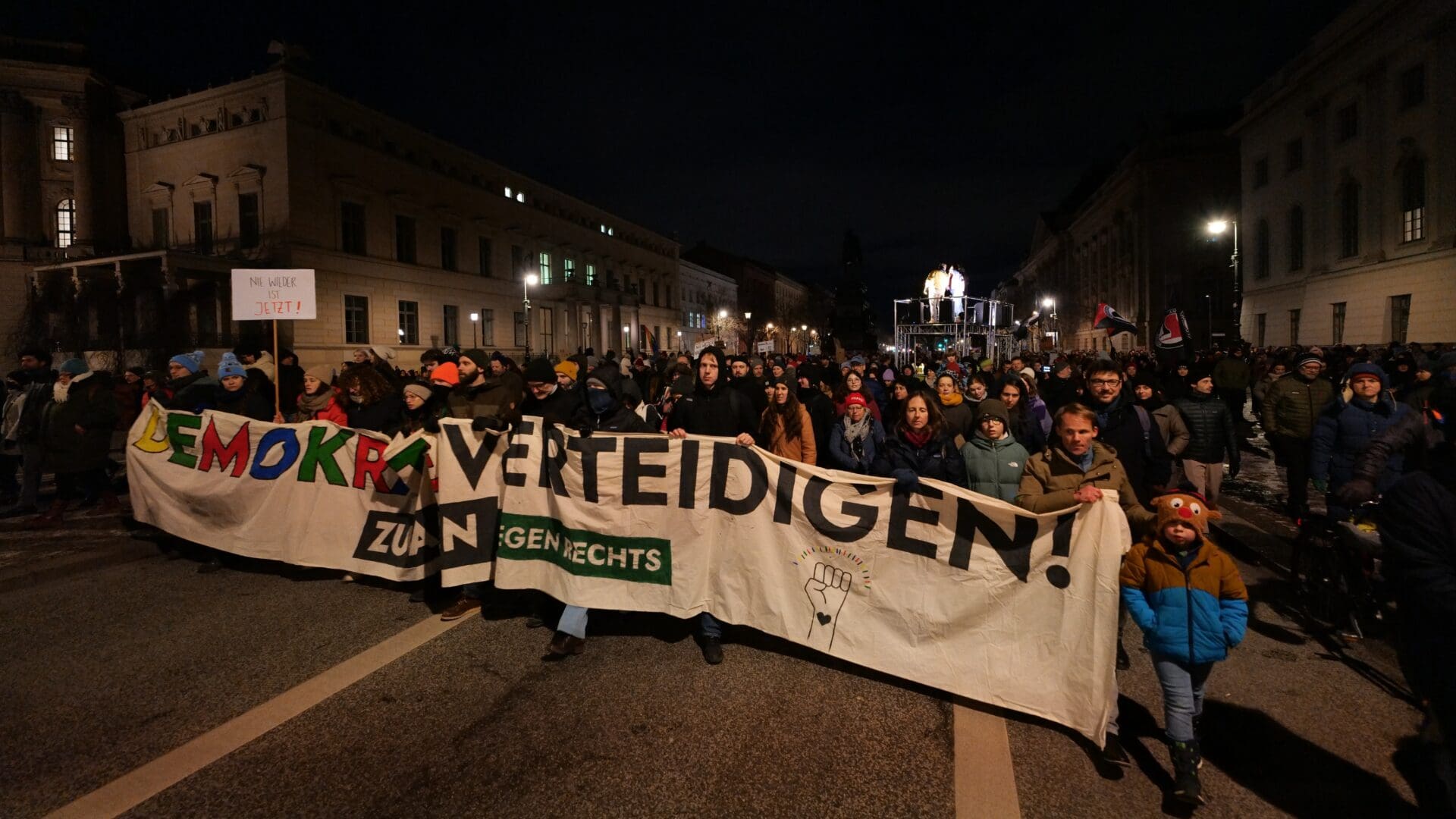Last weekend, hundreds of thousands of Germans took to the streets to protest against the ‘rise of fascism.’ Demonstrations in major cities focused on the Alternative for Germany (AfD) party, prompted by an investigative report suggesting that the right-wing party would implement mass deportations if it were to come to power.
The bomb was dropped by the German investigative portal CORRECTIV, which published a lengthy article in early January about a secret meeting last November involving far-right organizations and individuals. The event was attended by four AfD politicians: Roland Hartwig, ex-adviser of the right-wing party’s co-chairman, Alice Weidel; Ulrich Seigmund, a member of parliament for Saxony-Anhalt; MP Gerrit Huy; and Tim Krause, the party’s Potsdam district leader. Two members of the Christian Democratic Party (CDU) were also present, although they did not represent the CDU and are members of the grassroots organization WerteUnion.
The conference was organized by Gernot Mörig, a well-known figure on the German far-right, while the keynote speaker was Martin Sellner, the leader of the Austrian Identitarian Movement. He espoused truly reprehensible ideas, which were portrayed in the mainstream left-wing media as the ‘master plan of the AfD.’
In his speech, Sellner outlined the concept he referred to as ‘remigration.’ It involves the deportation of three target groups of immigrants from Germany: asylum seekers, non-ethnic Germans with residence permits, and ‘unassimilated’ Germans—individuals with an immigrant background but German citizenship who, from Sellner’s perspective, do not contribute to Germany’s development and have failed to integrate. According to Sellner’s plan, these individuals would be deported to a ‘model state’ in North Africa.
It is particularly important to note that these ideas were not expressed by an AfD politician attending the event,
nor were they endorsed, as reported—a fact that tends to be overlooked by the international press.
Another crucial aspect of the matter is that Roland Hartwig, who attended the meeting, was immediately dismissed from his position as an adviser, and the AfD distanced itself from the remarks made at the event. Following the scandal, Alice Weidel emphasized that all those with German citizenship are part of the German people, and the AfD views them as such. ‘The AfD is a political party under the rule of law and thus pledges its unequivocal allegiance to the German nation, which includes all those with German citizenship. Immigrants with German citizenship are just as German as the descendants of a family that has lived in Germany for centuries,’ states the party’s website.
Despite these reassurances, tens of thousands of demonstrators took to the streets of major German cities, with police and organizers estimating that around 300,000 people in total participated in the weekend protests against the alleged rise of fascism.
Jeffrey Ⓥ on Twitter: “Meanwhile in Germany.”A marketplace in Bremen a few hours ago. It’s a demonstration against the German Fascist NAZI, which is gaining power at the moment. The demonstrations are everywhere across Germany right now.”#Germany #Fascism pic.twitter.com/DN6QoIH7Xq / Twitter”
Meanwhile in Germany.”A marketplace in Bremen a few hours ago. It’s a demonstration against the German Fascist NAZI, which is gaining power at the moment. The demonstrations are everywhere across Germany right now.”#Germany #Fascism pic.twitter.com/DN6QoIH7Xq
The international and German left-wing press has consistently referred to Sellner’s remarks as the ‘AfD’s master plan’, further escalating tensions with the right-wing party. Vice-Chancellor Robert Habeck has stated that the AfD would turn Germany into a dictatorship, and, according to The Guardian’s report, the Green politician supports the ban of the right-wing party. The Federal Constitutional Court has recently suspended state funding for the far-right party Homeland for six years, a decision that Bavarian Prime Minister Markus Söder said could set an example for sanctions against the AfD. A petition calling for the party to be banned has already garnered over 700,000 signatures, and CDU politician Marco Wanderwitz is lobbying the federal parliament to ban the AfD.
So, CORRECTIV achieved its goal: hundreds of thousands of people took to the streets against the AfD, a party that has been steadily growing for months and is currently backed by 22 to 25 per cent of the voters, making it Germany’s second-largest party. Banning it is now more realistic than ever before, even though the possibility had been discussed earlier.
Distraction Favours the Left
But in whose interest was it, and why now, to drop the ‘atomic bomb’? To grasp the full picture, we need to consider several factors. Let’s begin with CORRECTIV, the entity that published the report. CORRECTIV is a media company oriented towards the public good and committed to strengthening democracy—or so the portal claims. ‘As a multi-award-winning editorial team, we stand for investigative journalism. We initiate public debates, collaborate with citizens on our research, and contribute to society through our educational programs,’ states their who-we-are blurb. The portal, however, which defines itself as independent,
is also associated with Hungarian-born American billionaire George Soros.
In 2017, the Soros-linked Open Society Foundations (OSF) provided CORRECTIV with a substantial grant as part of a fact-checking project focused on news about crimes committed by immigrants.
Of course, the timing is no coincidence. In Germany, farmers’ demonstrations have been ongoing since the start of the new year, and rail workers went on a six-day strike just this week. According to an analysis by Deutsche Welle, this could result in a loss of around EUR 1 billion for the already ailing German economy. Support for the three-party federal government, comprised of the Social Democrats (SPD), the Liberals (FDP), and the Greens, is steadily declining. The SPD has lost more than ten percentage points of support since the 2021 elections, while the FDP is barely at five per cent. According to an article in the Berliner Zeitung, 64 per cent of Germans believe that Chancellor Olaf Scholz should be replaced immediately. From this perspective, the hit piece on the AfD comes at the perfect time for the left-wing government:
by instilling fear about fascism and demonizing right-wing parties, they can divert attention from their own incompetence.
The scandal could also have significance for the upcoming European Parliament elections, as AfD seats are crucial for a potential right-wing shift. This is well-known in the European Parliament, which coincidentally held a debate on the fight against fascism in Europe at the same time the AfD scandal broke. It is important to note that, similarly to their deafening silence on the unconstitutional abuses of the Polish government under Donald Tusk, the left-wing majority in the EP, which is allegedly so committed to safeguarding the rule of law, has not voiced opposition to the ban on the AfD.
In Germany, the Federal Constitutional Court can decide whether a party should be banned, but only if it poses a threat to the very existence of Germany or attempts to undermine the free democratic order. In the case of the AfD, this is not applicable, as it was not its politicians who formulated the plan to deport immigrants, and its leadership immediately distanced itself from what was said at the meeting. In light of this, the attempts to ban the AfD either cross or, more precisely, violate the red line of the rule of law.
Demonization, an Old Tactic
The demonization of right-wing parties, opinions, and personalities is an age-old weapon in the left’s arsenal. A recent example, as reported by Hungarian Conservative, is a ‘dirty dozen’ list compiled by the Brussels-based news portal POLITICO on the occasion of the World Economic Forum in Davos. The list included Hungarian President Katalin Novák, but the weak argumentation in the article as to why she ended up among the bad guys only made it clear that she was only included because Hungary takes a different position from the international mainstream on some key issues.
However, we don‘t need to look that far; one only needs to examine social networking sites dominated by the left: expressing an opinion on one of these sites that differs from the left's position immediately results in stigmatization, or in the worst case, being banned.
The Hungarian government has been the target of left-wing smear campaigns for many years, although those have had little success thus far. The first major attack on Hungary by the left-wing international press and politicians occurred during the 2015 migration crisis, when Viktor Orbán and his government prioritized border protection over virtue-signalling solidarity with economic migrants. This was sufficient to label the head of government a dictator and declare Hungary an authoritarian state. Since then, hardly a day has passed without the left‘s mouthpieces in the press covering Hungary, usually in a negative tone. This has been exacerbated by the outbreak of the war in Ukraine, where the Orbán government's position again differs from that of the Western mainstream. Similarly to the migration policy, it is increasingly apparent that Viktor Orbán may ultimately be proven right on the war in Ukraine, and yet the attacks are intensifying—as we have become accustomed to.
Returning to the AfD scandal, for the moment, we can only hope that efforts to ban the party will not be successful. Considering it is Germany‘s second-largest party, such an attempt would likely provoke a massive outcry, with supporters taking to the streets and the country teetering on the brink of civil war.
Let there be no doubt that the current stigmatization and smear campaign is only the beginning,
and there will likely be many more attacks of this kind on European right-wing parties between now and the EP elections in June. We will see at the ballot box whether they have hit the mark or whether, as in Hungary, people will disregard the disinformation and use their common sense to decide the future of Europe.
Related articles:








